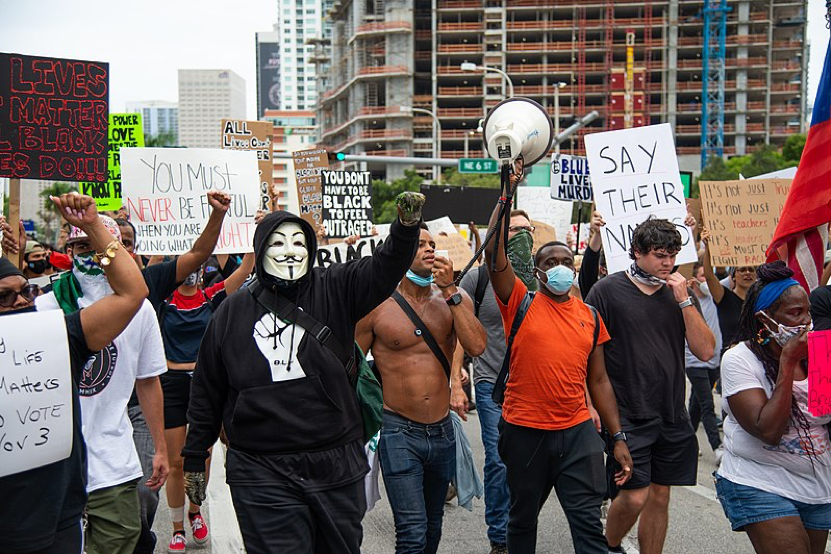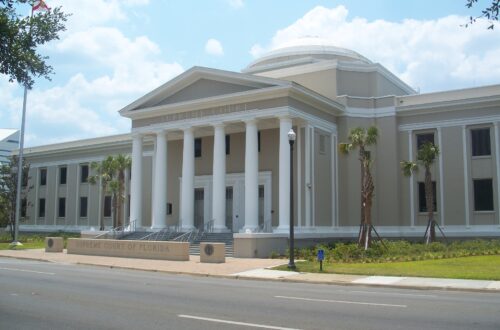Governor Ron DeSantis, R-Fla., drafted “anti-mob” legislation that was distributed to the Senate Committee on Criminal Justice. The proposal provides more leeway for private citizens to take potentially lethal action against protestors.
The Florida governor proposed the “anti-mob legislation draft” in response to the increase in protests over the summer. DeSantis remains committed to his pledge to “crack down on violent and disorderly assemblies.”
The proposal expands Florida’s Stand Your Ground Law. Supporters view the law as a self-defense initiative while critics call it the “right-to-commit-murder law.” Since 2013, the law has become well known as the basis for acquitting Trayvon Martin’s fatal shooter.
Under this law, a person is permitted to use deadly force if they reasonably believe that it is necessary to prevent a forcible felony.
A forcible felony as defined by Florida Statute 776.08 includes treason, murder, manslaughter, sexual battery, carjacking, home-invasion robbery, and other felonies that involve the use or threat of physical force.
DeSantis’s proposed legislation would expand a forcible felony to explicitly include looting, criminal mischief that interrupts or impairs business operation, and arson that interrupts or impairs business operation.
The proposal outlines numerous offenses such as violent or disorderly assemblies, obstructing roadways, throwing objects, damage to property, intimidation and harassment, and assault or battery of law enforcement. Punishment ranges from a second-degree misdemeanor to a life felony, which translates to at least 60 days in prison and up to life in prison.
The proposal has been confronted with a flood of criticism.
On Nov. 16, organizations in the Florida Alliance Against Racist and Political Repression hosted a webinar to discuss the proposed legislation. Ruth Beltran, a representative from Florida’s Party for Socialism and Liberation, dubbed the legislation an “abuse on power bill” that “criminalizes the Black Lives Matter movement.”
This sentiment is echoed by critics, namely social justice groups and Democrats, who tout the proposal as unconstitutional and racist. They argue that the penalties outlined in the proposal will disproportionately affect people of color.
Critics worry about the proposal’s vagueness and subjectivity. “It dangerously gives armed private citizens power to kill as they subjectively determine what constitutes ‘criminal mischief’ that interferes with a business,” said Aubrey Webb, a former Miami-Dade prosecutor.
However, supporters of the proposal view the legislation as equipping individual Floridians with necessary protection in the wake of protests that have caused injury, destruction of property, and death.
Republicans are hopeful that the legislation is a first step to keeping citizens safe on both sides of the aisle.
“One of the pros is that it creates immunity and protection for people who have to escape from a violent encounter if their car is surrounded, for example,” said constitutional attorney Eric Friday.
Friday is referring to a section in the proposal that would provide immunity to motorists who unintentionally hit protestors blocking traffic. While supporters view this as protection for unsuspecting motorists who are attacked by protestors, critics view it as an open door for innocent protestors to be run over.
Since May 2020, motorists have driven into protestors at least 104 times. Two deaths have been reported from such incidents.
A central theme is whether DeSantis’s proposal infringes upon people’s First Amendment right to protest.
Supporters say it does not because people have the right to peacefully protest. The proposal’s list of offenses only applies to protestors who create immediate danger or damage to people or property, substantially obstruct law enforcement, or deprive any person of a legal right.
Critics point to this verbiage as the reason for the proposal’s unconstitutionality. The vagueness of “depriving any person of a legal right” could lead to massive amounts of protestors being charged with misdemeanors and felonies.
It is this fear of punishment, critics argue, that impedes people from their right to protest. “It’s an attack to strip protestors of political power and participation and disenfranchise them from being able to play an active role in changing society,” said Crystal Kim, a Florida criminal defense attorney who spoke at the Florida Alliance Against Racist and Political Repression webinar.
No legislators have publicly stated that they will sponsor the proposal, and no bills have been filed in the House or Senate. For now, the drafted legislation remains nothing more than a proposal.
Featured image: Protests in Miami, Florida on June 6, 2020 against the police killing of George Floyd. Unmodified photo by Mike Shaheen used under a Creative Commons license. (https://bit.ly/2YSb1cy)
Check out other recent articles from the Florida Political Review here.





